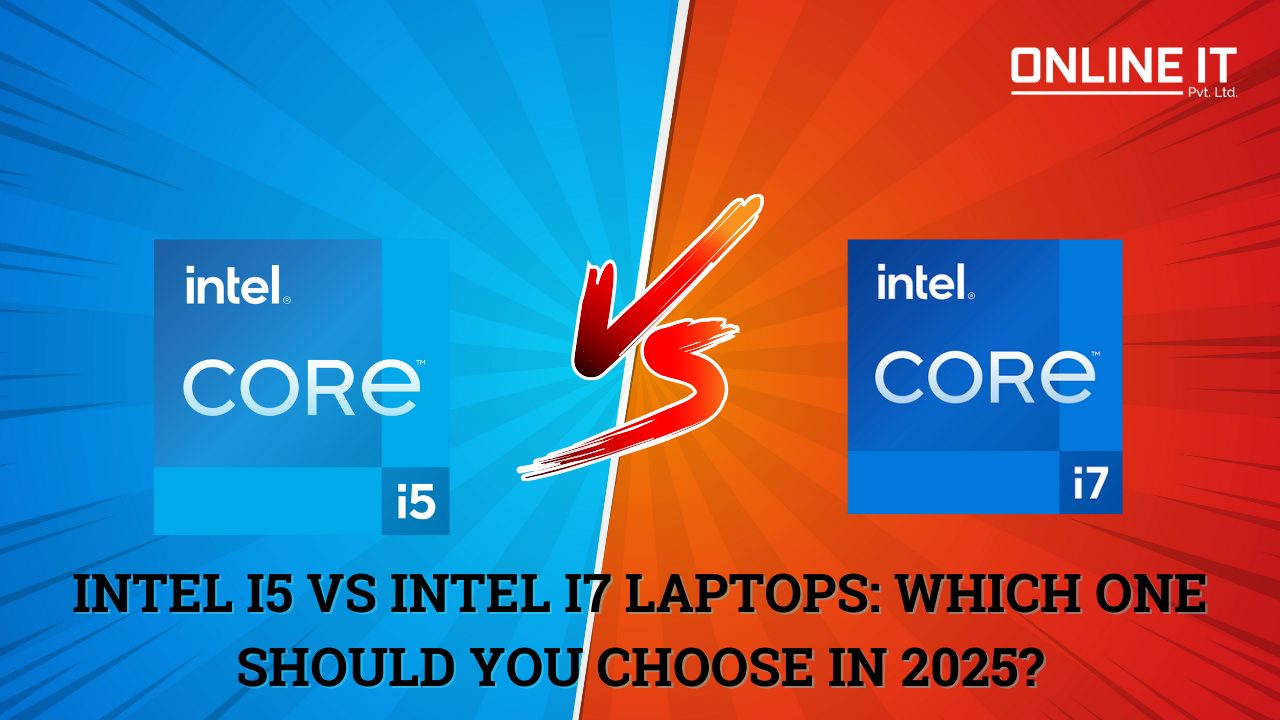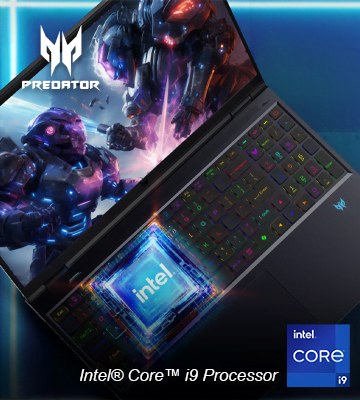Intel i5 vs Intel i7 Laptops: Which is Best for You in 2025?

If you’re shopping for a laptop in 2025, choosing between Intel’s Core i5 and i7 comes down to how you plan to use your device. The i5 is a solid choice for everyday tasks and moderate workloads, while the i7 is designed for power users. In this guide, we break down the key differences, performance benchmarks, and best use cases to help you make an informed decision. You can also check the latest laptop price in Nepal to find a model that fits your budget and needs.
Who Should Choose an Intel Core i5 Laptop in 2025?
An Intel i5 laptop is ideal for those who want dependable performance without overspending. The 13th and 14th Gen i5 chips strike a strong balance between power and efficiency, with most models offering 10 cores (6 performance + 4 efficiency) and support for Intel Iris Xe graphics.
Ideal For:
- Students: Perfect for research, assignments, and streaming lectures. Handles Google Workspace, Zoom, and Canva effortlessly.
- Office Professionals: Great for multitasking between Excel, Outlook, web apps, and video calls.
- Casual Gamers: When paired with an entry-level GPU like the RTX 3050, it runs games like CS: GO, Apex Legends, and Fortnite smoothly.
- Content Consumers: Delivers fluid performance for web browsing, YouTube, and streaming Netflix or Prime Video in 4K.
- Light Creators: Handle occasional photo editing or podcast recording in apps like Audacity or Lightroom.
Who Should Choose an Intel Core i7 Laptop in 2025?
The Intel i7 laptop, especially the 13th and 14th Gen H-series chips, offers serious horsepower. With up to 14 cores and higher boost speeds, i7 laptops are great for users who run demanding applications and need faster multitasking.
Best Suited For:
- Video Editors and designers: This is excellent for Adobe Premiere Pro, After Effects, or Autocad. Rendering is faster, and multitasking is smoother.
- Developers & Engineers: Whether you’re compiling in Visual Studio, managing VMS, or building in Docker, the i7 handles it with ease.
- Gamers & Streamers: It supports high-refresh-rate gaming at 1080p/1440p with GPUS like RTX 4060/4070. It is also suitable for live streaming with OBS.
- Data Analysts: Smooth performance in Excel with large datasets or in Power BI and Python-based tools.
- Remote Professionals: Can handle multiple monitors, VDI, and heavy Chrome multitasking with no slowdowns.
Performance Comparison Table
| Feature | Intel Core i5 | Intel Core i7 |
| Cores/Threads | 6-10 Cores / 12-16 Threads | 8-16 Cores / 16-24 Threads |
| Clock Speed | 3.0 – 4.5 GHz | 3.2 – 5.0 GHz |
| Cache Memory | 8MB – 16MB | 12MB – 24MB |
| Power Efficiency | More efficient | Consumes more power |
| Gaming Performance | Good for mid-range gaming | Excellent for high-end gaming |
| Video Editing | Basic to moderate editing | Smooth 4K editing |
| Battery Life | Longer battery life | Shorter battery due to high performance |
| Heat Generation | Less heat | More heat due to higher power |
Pros and Cons of Intel i5 Laptops
Pros of Intel i5 Laptops:
- Affordable Pricing: It offers excellent value for money, making it ideal for budget-conscious users.
- Lower Power Consumption: Efficient energy usage results in longer battery life, making it ideal for students, office workers, and travellers.
- Handles Everyday Tasks Efficiently: Ideal for productivity apps, web browsing, and media consumption, with minimal performance lags.
- Decent for Casual Gaming: Paired with a mid-range GPU, it supports light gaming without issues.
Cons of Intel i5 Laptops:
- Limited Performance in High-End Tasks: Struggles with heavy multitasking or running demanding software like video editors or 3D modelling tools.
- Not Ideal for 4K Video Editing or Heavy Gaming: If you’re into professional content creation or high-performance gaming, the i5 might not be the best choice.
- Single-Core Performance Limits: It may not be the best choice for software that demands high single-core performance (e.g., specific coding environments).
Pros and Cons of Intel i7 Laptops
Pros of Intel i7 Laptops:
- Faster Performance and Multitasking: Excellent for handling heavy workloads, such as video editing, 3D rendering, or programming, with ease.
- Ideal for Professional Workloads: Great for users in creative industries (e.g., designers, video editors) or power users who need reliable performance for coding and simulations.
- Better GPU Integration for Gaming: Paired with higher-end graphics cards, the i7 can run AAA games and intensive graphical applications smoothly.
- Enhanced Multithreading: Handles multiple processes and threads better, improving overall productivity in a professional setting.
Cons of Intel i7 Laptops:
- Higher Price Point: i7 laptops are generally more expensive, making them less budget-friendly for those with basic computing needs.
- Consumes More Power and Generates More Heat: The i7’s power and performance come at the cost of higher energy consumption and increased thermal output, leading to shorter battery life and potential overheating.
- May Be Overkill for Basic Users: The i7 might be unnecessarily powerful if you don’t need high-level multitasking or content creation performance.
Real-World Performance Benchmarks: Intel i5 vs Intel i7
Gaming Performance:
- Intel i5: In modern games, an i5 laptop typically delivers around 60-90 FPS at medium settings. It offers a smooth gaming experience for casual gamers and those playing less demanding titles. However, performance can drop with higher graphics settings or more challenging games.
- Intel i7: When paired with a dedicated graphics processing unit (GPU), the Intel i7 processor can achieve 100+ frames per second (FPS) at high settings with improved stability. It’s ideal for gamers looking for an optimal balance of performance and graphical quality, even in the most demanding AAA games.
Video Editing Performance:
- Intel i5: Rendering a 10-minute 4K video in editing software, such as Adobe Premiere Pro, may take approximately 15 minutes with an Intel i5. While it handles basic editing tasks well, rendering large, high-definition video files can be slower.
- Intel i7: The i7 processor significantly reduces rendering time, completing the same 10-minute 4K video in about 8-10 minutes. Its higher core count and faster clock speeds make it much more efficient for tasks like video editing, 3D rendering, and other creative workflows.
Battery Life:
- Intel i5: Laptops equipped with Intel i5 processors typically offer 6-10 hours of battery life on a single charge, depending on usage. This makes the i5 a solid choice for users who need an efficient laptop for daily tasks, productivity, and light gaming.
- Intel i7: While Intel i7 laptops offer superior performance, they tend to consume more power, resulting in a battery life of 4-7 hours. For power users requiring high performance, this is a trade-off, especially for intensive workloads or gaming sessions.
Example i5 and i7 Laptops
If you’re considering an i5 laptop, check out models like:
For i7 laptops, consider:
Conclusion
If you’re after a laptop for everyday tasks like browsing, streaming, and office work, an Intel i5 laptop offers excellent value and efficiency. It strikes a balance between price and performance, making it a solid choice for most users. However, if your workload involves demanding tasks such as gaming, video editing, or software development, opting for an Intel i7 laptop is a more intelligent investment. With more cores and higher processing power, the i7 is built for high-performance needs. Explore various models to find one that best aligns with your requirements.
Is the i7 better than the i5 laptop?
Yes, an Intel Core i7 laptop is better than an i5 in terms of performance. It has more cores or threads, faster processing speed, and better support for multitasking. i7 laptops are ideal for users who run heavy software, edit videos, play modern games, or work with large datasets. However, they are usually more expensive than i5 models. If you only need a laptop for general tasks like browsing, documents, and streaming, an i5 may be enough.
Is Core 5 or Core 7 better?
Core i7 is better than Core i5 in processing power and speed. It handles demanding tasks more efficiently, which is useful for professionals, gamers, or creators. Core i5 is also a strong processor, suitable for everyday use, including office work, school projects, and light software. If your tasks are basic, a Core i5 is cost-effective. But if you need extra speed or plan to keep your laptop for several years, going for a Core i7 is a better choice.
Is i5 or i7 better for students?
For most students, a Core i5 laptop is good enough. It supports common activities like web browsing, online classes, note-taking, and running light software. It also consumes less power and often costs less. But if you're a student in a technical field like engineering, architecture, or media studies—where you need to run tools like AutoCAD or Adobe apps—then a Core i7 will perform better and save time. Choose based on what type of software you need to use.
Is an i5 enough for a laptop?
Yes, a Core i5 processor is enough for most users. It can handle daily activities like using Microsoft Office, attending online meetings, watching videos, browsing the internet, and even light editing or casual gaming. It offers a good balance between speed, battery life, and cost. Unless you work with demanding programs or games, there is no strong need to spend more on an i7. For average users, i5 gives solid performance.



